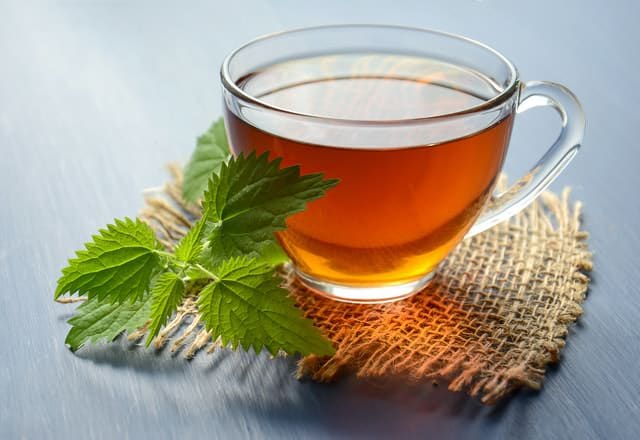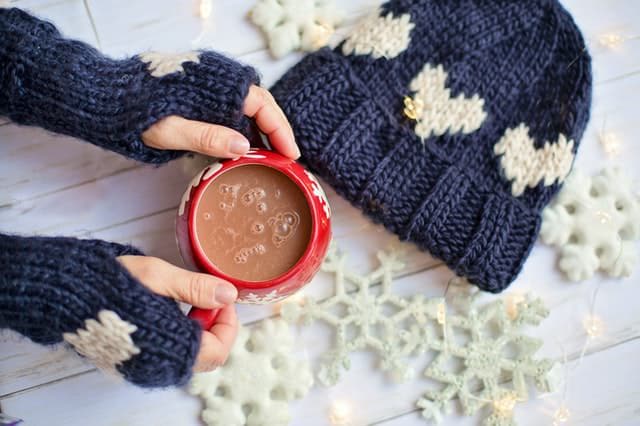Table of Contents
Last updated on June 13th, 2021 at 08:52 pm
When we think about going vegan, we often feel that we have to give up on our favorite vanilla or peppermint chocolate latte. Contrary to popular belief, going vegan doesn’t mean sacrificing your treasured morning cuppa’ joe. You can still have that coffee and drink it too (with plant-based milk, of course).
Vegan Hot Drinks with Health Benefits
Here’s a list of vegan, plant-based hot beverages that you can continue to enjoy or introduce into your diet.
1. Coffee
Coffee lovers consume it in many ways — black, with milk, foam, chocolate, syrup, and the list goes on.
Black coffee is naturally vegan, as its ingredients are just water and coffee.

However, bear in mind to check that the coffee is grown regeneratively — it doesn’t directly or indirectly harm the environment, the soil, the animals, and humans (no exploitation of workers) and does not have any ramifications to the Earth and inhabitants.
When adding milk or foam, opt for plant-based milk options. Almond, soy, and coconut milk are not always recommended due to harmful farming practices and labor exploitation because of increasing demand.
In addition to that, almonds are water-intensive plants and need the most water than other plant-based milk, but still less than dairy milk.
Coconut milk is not local to the Global North. Hence, there are added carbon emissions to fly them from their tropical homeland. Again, the airline industry contributes about 2% of carbon emissions than 3% from dairy and 14.5% from livestock. Besides, the airline industry is transporting more than coconut milk.
Furthermore, these non-dairy milks have been linked to deforestation to plant these as monocultures and meet global demand. Look for sustainable and fair-trade certifications when purchasing plant-based milks.
Recommended plant-based milks are hazelnut milk and pea milk since they are currently the least harmful to the planet. They are not water-intensive. The wind pollinates hazelnut milk; hence bees are not forced and stressed to pollinate the trees, unlike almonds.
Oat milk is also an option. However, the current farming practices of using carcinogen pesticides and fertilizers harm the soil and its ecosystem, waterways, animals above and below ground, laborers, and other humans consuming it. If oat milk is your go-to option, ensure that the oats are farmed in regenerative farms, buy them from small independent farmers instead of big brands.
When adding other ingredients into your coffee, like syrups or chocolate, ensure they are vegan (no honey, no dairy). Most cafés carry syrups and chocolates that are vegan, but it wouldn’t hurt to double-check.
Over the years, we’ve heard about the many benefits of coffee, such as coffee helps us burn fat, has antioxidants which help reduce the risk of cancer, is anti-inflammatory, increases focus and alertness, reduces the risk of type-2 diabetes, protects our brains, and fights depression as it stimulates the central nervous system and increases the transmission of serotonin, noradrenaline, and dopamine.
Too much coffee, on the other hand, makes us overactive and can affect our sleep. Drink it in moderation.
2. Green Tea
Green tea is a variation of tea harvested from the same plant as black tea, the Camellia_sinensis, but is processed differently from black tea to get a different oxidation level. Originally from China, it is now grown and processed in other parts of East Asia.

Touted as one of the healthiest drinks on Earth, green tea is more beneficial than black tea due to the processing. There is a fermentation stage to produce black tea. However, for green tea, it stops before the fermentation stage. As such, green tee retains most of its nutrients. Some benefits include:
- Boosts metabolism and helps with weight loss.
- Regulates glucose levels.
- Good for the heart as it prevents the formation of clots and keeps the blood vessels relaxed, which also helps with blood pressure.
- Reduces the risk of cancer due to high levels of antioxidants and polyphenols.
- Reduces bad cholesterol.
- Reduces the risk of Parkinson’s and Alzheimer’s as the antioxidants protect the brain cells and restore damaged cells.
- Prevents tooth decay due to the presence of catechin (an antibacterial and antiviral) that destroys viruses and bacteria that cause infections in the throat and dental areas.
- Helps with depression due to the presence of the amino acid Theanine that provides a relaxing and tranquilizing effect.
- Fights viruses and bacteria as green tea is antiviral and antibacterial and is also anti-inflammatory due to the antioxidants.
- Improves skin condition due to the antioxidants and its anti-inflammatory characteristics; green tea can help with wrinkles, signs of aging, and scars. It can also reduce pimples due to its antibacterial properties. Used green tea bags can be used to dab on the skin to improve the skin.
3. Black Tea
Although black tea is harvested from the same plant as green tea, it is processed differently and undergoes a fermentation process.
Black tea does have its own set of benefits despite undergoing additional processing. It is vegan, as is it from a plant, and no animal products are used in its fermentation process.

Benefits of black tea include:
- Reduces blood pressure due to the presence of the same properties as green tea.
- Improves metabolism, focus, and alertness due to the presence of caffeine.
- Reduces risk to cancer and is anti-inflammatory due to the presence of thearubigins (a type of polyphenol).
- Improves shine, luster, and darkness to hair when included in your hair care regimen.
- Improves skin condition due to the presence of antioxidants, and placing a used tea bag under your eye can reduce puffiness.
- Prevents tooth decay due to the presence of polyphenols and tannins.
- Improves the immune system due to the presence of alkylamine antigens.
Due to its caffeine content, too much tea can affect sleep — drink in moderation.
Earl grey tea, English breakfast tea, Ceylon tea, Chai tea, Nilgiri tea are some examples of black tea sold.
Various Flower Teas
Can Flowers be tea? Well, yes, some flowers, the ones that can be consumed. What is tea exactly? Tea is a hot beverage made by pouring hot water over leaves or, flowers. Some flowers can be consumed as a tea and are beneficial to us. An added advantage — flower teas are caffeine-free.
Here’s a list of flower teas and their benefits:
4. Chamomile Tea
Chamomile is a tiny flowering herb that looks like a little daisy, originally from Ancient Egypt. It is one of the most ancient medicinal herbs and was consumed by our ancient Egyptian ancestors. The dried flowers, used to prepare the tea, are rich in terpenoids and flavonoids, which give the flowers its medicinal properties.
Chamomile tea is rich in antioxidants, is anti-inflammatory, and is a mild astringent. It helps with cancers, heals scars, cuts, and burns, reduces menstrual cramps, and improves our immune system. Additionally, it acts as a natural sedative, helps with stress and promotes better sleep. Drink up if you want a good night’s sleep.
5. Echinacea Tea
Somewhat related to the chamomile, Echinacea is also another flower tea with medicinal properties. The flowers look like daisies with purple petals, is coned-shaped, and grows commonly in North America and Europe.
The tea can be prepared with the dried flowers or fresh flowers. Sometimes the roots and leaves can be used to make tea too. Echinacea is known to boost your immune system and can help fight germs and combat coughs and colds.
6. Hibiscus Tea
The hibiscus tea is made by steeping dried hibiscus flower in hot water, producing a crimson red beverage. The species may differ depending on the location and climate; however, Hibiscus sabdariffa is most commonly used.
Hibiscus tea is rich in vitamin C, flavonoids, and has laxative properties. It helps with improving skin condition, fighting colds, preventing hypertension, lowering blood pressure and reducing blood sugar levels, maintaining a healthy liver, reducing menstrual cramps, and helping with digestions and weight management. Hibiscus tea can be used as a stay-in hair conditioner to achieve lustrous locks.
Drinking too much hibiscus tea is not recommended as it can affect the estrogen levels in women, which may have consequences on pregnancy and fertility. It is best to avoid if one wishes to get pregnant. It is also not suitable for those with low blood pressure as it can further reduce the blood pressure levels. Some may not consider hibiscus tea vegan as it is sometimes tested on animals.
7. Rosehip Tea
Not exactly a flower tea; it is made from the fruit of the rose plant, the rounded part of the flower below the petals (still from a flowering plant). Rosehip is rich in polyphenols, carotenoids, essential fatty acids, lycopene, and vitamin C. This means it is good for the immune system, good for our skin, and is anti-inflammatory — keeps our body and heart healthy.
8. Passionflower Tea
Passionflower tea is a traditional herbal sedative known to help with sleep. This flower has been used by Native Americans for centuries to treat various conditions, including boils, wounds, earaches, and liver problems. There are more than 500 species with different benefits, but the most commonly available is the Passiflora incarnate, which is used to treat anxiety and insomnia.
9. Ginger Tea
Ooooh, the smell of home, ginger tea. It can be made easily at home by pouring hot water over pounded ginger, and it is not caffeinated.
The tea can be sweetened with maple syrup, and it can be sipped with lemon, or on its own. Ginger tea is exceptionally beneficial to soothe the stomach, help with digestion, and detox the body.
Ginger tea also helps with gas, bloating, and nausea. Some nausea pills are made with ginger. During the winter months, drink ginger tea to keep you warm inside.
10. Rooibos Tea
This non-caffeinated tea has been harvested and drank for over 300 years by the Cederberg region’s indigenous bushmen in South Africa, the Khoisan people.
The leaves are harvested from the Aspalathus Linearis plant and are used to make herbal remedies for many ailments. This plant only grows in this region and cannot grow elsewhere; many have tried and failed.
Rooibos tea is packed with antioxidants; thus, it is good to fight cancer and helps with the heart. It is also anti-inflammatory. However, too much of this tea can stimulate the production of estrogen, hence drink in moderation.
Herbal Teas
Similar to flower teas, there are a few herbs that can be used to make tea. They include:
11. Peppermint Tea
Made by steeping peppermint leaves in hot water, peppermint tea is good to take for an upset tummy as it helps with gas, bloating, and indigestion. It also helps with headaches and migraines, reduces menstrual cramps, and increases our energy and alertness levels. Peppermint tea is anti-inflammatory, antibacterial, and antiviral. Hence, it helps fight off bacteria, viruses, and keeps the body healthy. Just like our toothpaste, peppermint tea can also freshen our breath.
12. Sage Tea
Another ancient herb, it has a long history of being used as traditional medicine. Sage tea is rich in antioxidants and anti-inflammatory compounds — good for the heart, skin, body, and immune system (antioxidants inhibits the oxidation and degeneration of our cells and is anti-inflammatory, hence keeping us healthy).
It is also said to improve oral health and strengthen our teeth. Sage tea can help control blood sugar levels and is good for our brain health too. Using sage tea as a hair rinse can result in soft and shiny hair. Too much sage tea can be toxic due to the presence of thujone. Thujone is what gives the sage its strong smell but can be harmful if taken in large amounts.
13. Lemon Balm Tea
Also from the mint family, the leaves of this herb can be used to make tea, which is antibacterial, antimicrobial, and rich in antioxidants — improves our immune system and keeps us healthy. It can also help with anxiety and improves sleep. Too much of this tea can cause gas and bloat, as with everything, drink in moderation.
14. Spiced Apple Cider
Ahh. The smell of spiced apple cider at the Christmas market. This warm drink is not only delicious, it’s also healthy. This fermented beverage is filled with probiotics, vitamins, polyphenols, and antioxidants.
Apples are rich in the antioxidant, quercetin, which is excellent for the heart and fights off cancer. The spices used, namely cinnamon and cloves, are antibacterial, antiviral, and rich in antioxidants.
Do drink in moderation as it is high in sugar, but don’t stop yourself from enjoying this winter staple.
Spiced apple cider now comes in mixed with other fruits, and some may contain honey, do check before you sip this delicious drink.
15. Hot Cocoa
Hot cocoa, the perfect winter beverage. It may sound unhealthy, but it is filled with benefits. Hot cocoa is said to keep your thinking and memory skills sharp as it improves blood flow to the brain. Cocoa is also said to be rich in polyphenols and antioxidants, which are released more when hot, making hot cocoa healthier than cold cocoa.

Hot cocoa can be taken in many ways, peppermint cocoa, Mexican spiced cocoa, orange cocoa, or just plain cocoa. A few things to note, though:
- When it comes to milk, do opt for plant-based options, a few have been recommended above.
- If buying cocoa powder, check that there is no milk powder mixed into it and avoid the instant cocoa mix as they are mostly artificial. Do opt for pure cocoa not mixed with anything.
- If buying at cafés, check with the barista if there are traces of dairy in their cocoa mix.
As with everything, drink it in moderation as it may be high in sugar (unless you do not use sugar in yours.)
16. Chai Latte
Chai itself is black tea and has many benefits, as listed above. However, the chai that is available commercially is added with spices, hence giving it more benefits.
The spices added, mainly cinnamon, cloves, black pepper, ginger, star anise, and cardamom, are rich in antioxidants, and are antibacterial and antiviral. Ginger also helps with digestion. Chai latte is perfect for keeping you warm in winter. When opting for this drink, ensure the following:
- When it comes to milk, opt for plant-based options, a few have been recommended above.
- If buying at cafés, ensure honey is not present in the mix. Most chai mixes available in cafés have honey for sweetness. The Starbucks chai latte has honey in it.
- Do not buy the instant chai mixes, instead make your own by using black tea and adding the spices mentioned above, then boil until the flavors are released.
17. Mulled Wine
Another winter and Christmas staple, mulled wine, similar to sangria, but it is warm and spiced. Originating in the 2nd century, the Romans created this winter drink who warmed red wine to defend their bodies against the harsh winter. Over time, spices were added for the additional benefits.
Mulled wine is red wine heated with spices, commonly cinnamon, cloves, and nutmeg. Fruits are sometimes added for sweetness. Spices are added to improve the immune system of the body. Mulled wine is not always considered vegan because red wine that is commonly sold in supermarkets are not. This is because most red wines are clarified and fined using fish bladder or other non-vegan agents. They are not in the final product itself but is used in the clarifying and fining processes.
The great news is there are vegan red wines available commercially. Check for those, and if you are ever at a Christmas market, check with the vendor if the wine is vegan and if honey is added to that tasty beverage.
There are so many hot beverages you can enjoy, even when vegan. If you can’t find them in cafés or supermarkets, you can always make them at home. Enjoy.

